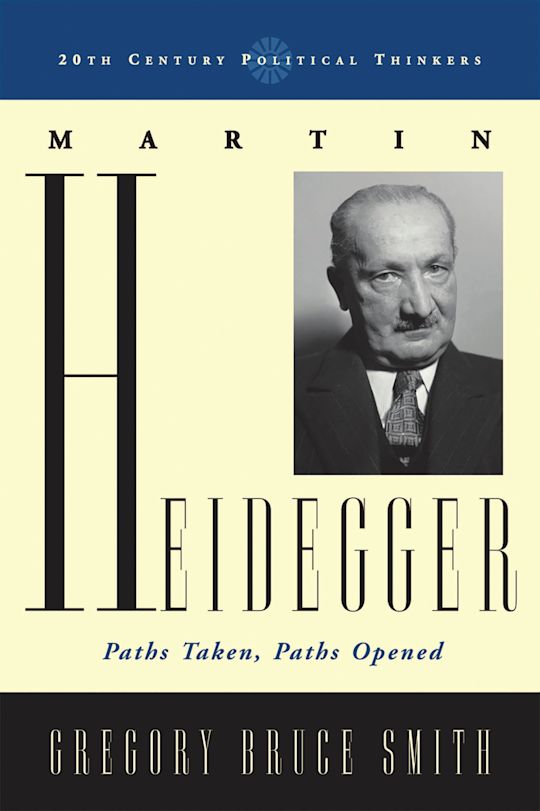- Home
- ACADEMIC
- Politics & International Relations
- Political Theory and Philosophy
- Martin Heidegger
This product is usually dispatched within 3 days
- Delivery and returns info
-
Free US delivery on orders $35 or over
You must sign in to add this item to your wishlist. Please sign in or create an account
Description
Since the publication of Victor Farias's Heidegger and Nazism, the discussion about the political significance of Martin Heidegger's thinking has been distorted. Because of his association with the Third Reich, some have dismissed Heidegger out of hand while others have sought to explain away certain connections. What is often lost in the writing of critics and advocates alike is an honest assessment of Heidegger as a political thinker and a frank interest in understanding his work.
Martin Heidegger: Paths Taken, Paths Opened takes Heidegger's philosophy on its own terms and explores the pivotal significance of his phenomenology for political theory. Heidegger opposed, at the deepest level, everything that informs the global, technological civilization that seems to be the fate of humanity. Yet even in the liberal and technologically oriented West we cannot proceed without a confrontation with his thought. In this timely addition to the 20th Century Political Thinkers series, Gregory Bruce Smith shows Heidegger's thought to be an inescapable challenge to our current ethical habits and contemporary political institutions.
In this path-breaking work, Smith establishes the centrality of Heidegger's thought, even to those who would claim to be his most ardent critics. Smith also addresses difficult interpretative questions regarding the relationship of Heidegger's early and later work and the status of political ideas with respect to Heidegger's phenomenological project. A work of broad interpretative breadth and keen political insight, Martin Heidegger: Paths Taken, Paths Opened establishes the undeniable importance of Heidegger's thought for the future of the tradition of political philosophy.
Table of Contents
Chapter 2 2 Introduction: Philosophy and the Issues of the Age
Chapter 3 3 Inventing a Life
Chapter 4 4 In the Beginning: The Young Heidegger
Chapter 5 5 Heidegger's Deconstruction of the Tradition
Chapter 6 6 Reinserting Being and Time
Chapter 7 7 On the Rectoratesrede
Chapter 8 8 Heidegger's Nietzsche
Chapter 9 9 On the Essence of Technology
Chapter 10 10 Art, Poetry and Gelassenheit: Phenonenology Returns
Chapter 11 11 Transitions and Crossings: Experiments in Post-Metaphysical Thinking
Chapter 12 12 Heideggerian Reflections
Chapter 13 13 Conclusion: Beyond the End of History?
Chapter 14 Bibliography
Chapter 15 Index
Product details
| Published | Nov 13 2006 |
|---|---|
| Format | Paperback |
| Edition | 1st |
| Extent | 352 |
| ISBN | 9780742552838 |
| Imprint | Rowman & Littlefield Publishers |
| Dimensions | 9 x 6 inches |
| Series | 20th Century Political Thinkers |
| Publisher | Bloomsbury Publishing |
About the contributors
Reviews
-
Gregory Smith persuasively displays both the unity and tension in Heidegger's work, subtly clarifies several of Heidegger's most difficult thoughts, and carefully outlines the scope of his influence.
Mark Blitz, Fletcher Jones Professor of Political Philosophy, Claremont McKenna College
-
Smith presents in detail the insights of Heidegger's work, following this with series of 'deflections,' or differing paths taken by philosophers who incorporate varying, sometimes opposed aspects of his work: Arendt, Derrisa, Strauss, Gadamer, Marcus, and Rorty. Smith concludes that Heidegger emphasizes philosophy's roosts in 'the phenomenological or pretheoretical experince of realtiy' and the reciporcal realtionship between philosophy and praxis. Recommended.
Choice Reviews
-
Both erudite and passionate, Gregory Smith's Martin Heidegger demonstrates the critical importance of Heidegger's thought for understanding our present philosophical dilemmas and for charting a genuinely human future. While fully acknowledging Heidegger's terrible political and moral errors and misdeeds, Smith at the same time rescues the profoundest level of his thinking from both its partisan detractors and its 'postmodernist' vulgarizers. Smith's book merits the attention of all serious students of political philosophy.
David Lewis Schaefer, Professor of Political Science, Holy Cross College



































